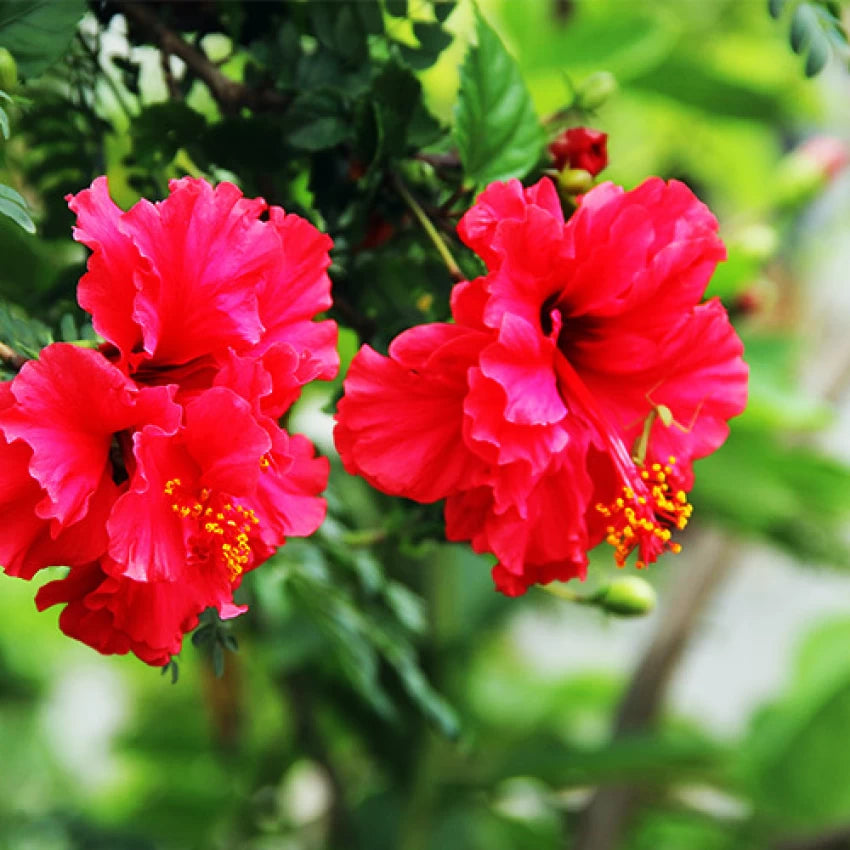

The Gudhal Tree, commonly known as the Hibiscus Tree (Hibiscus rosa-sinensis), is a stunning ornamental and medicinal plant revered for its vibrant flowers and incredible versatility. Known as the "queen of tropical gardens," the Gudhal Tree has Read more
Trending
Trees for Corporates
Gudhal Plant: Hair Care Hero, Medicinal Uses, and Garden Charm
You may also like
Corporate Plantations
Gudhal Plant Benefits
The Gudhal plant, or hibiscus, is a triple-threat with its vibrant blooms, hair care benefits, and medicinal uses. It’s the botanical beauty queen that enhances your garden, your hair, and your health effortlessly.
Gudhal Flowers for Hair Care
These stunning red blooms are a secret weapon for luscious locks. Used in oils and masks, Gudhal flowers promote hair growth, reduce dandruff, and add shine that rivals the glossiest ads.
Medicinal Uses of Gudhal Plant
From soothing inflammation to improving digestion, Gudhal is a natural healer. Its flowers, leaves, and roots are packed with medicinal properties, making it a must-have for holistic wellness.
Growing Gudhal Plants at Home
Gudhal thrives in well-drained soil and loves sunny spots. Plant one, and enjoy its colorful charm while reaping its health and beauty benefits straight from your garden.
Gudhal Plant for Skin Health
Gudhal is a natural anti-aging hero, known for hydrating and rejuvenating skin. Its extracts are used in face masks and toners, leaving your skin glowing and refreshed.
Gudhal Tea Benefits
Brewed from its petals, Gudhal tea is rich in antioxidants, aiding weight loss, lowering blood pressure, and boosting immunity. It’s your daily wellness sip with a floral twist.
Gudhal as a Garden Charm
With its vibrant flowers and lush foliage, Gudhal adds tropical beauty to any garden. It’s the plant that turns your backyard into a vacation-worthy retreat.
Gudhal for Dandruff Control
Say goodbye to flakes with Gudhal’s natural antifungal properties. Used as a scalp treatment, it soothes irritation and keeps your scalp healthy and flake-free.
Gudhal Plant for Pollinators
Gudhal flowers are a favorite among bees and butterflies, turning your garden into a buzzing paradise while supporting local ecosystems.
Gudhal Plant in Ayurveda
Revered in Ayurveda, Gudhal is used to treat everything from menstrual cramps to skin issues. It’s the ancient remedy that still works wonders today.
Gudhal Leaves for Health
Gudhal leaves are rich in nutrients and are used in teas and herbal remedies to boost immunity and improve digestion. They’re as valuable as the plant’s vibrant blooms.
Gudhal for Eco-Friendly Gardening
Drought-tolerant and low-maintenance, Gudhal is a sustainable choice for eco-conscious gardeners. It’s the green-thumbed friend that’s good for you and the planet.
FAQ
What is the Gudhal plant and why is it called a hair care hero?
Gudhal, or hibiscus, is celebrated for its vibrant blooms and natural ability to promote hair growth, reduce dandruff, and add shine. It’s the go-to plant for luscious locks and effortless garden charm.
How can I grow a Gudhal plant at home?
Growing Gudhal is simple. Plant it in well-drained soil, place it in a sunny spot, and water regularly. It rewards you with beautiful flowers and endless health and beauty benefits.
What are the hair care benefits of Gudhal flowers?
Gudhal flowers stimulate hair growth, reduce dandruff, and add shine. Whether in oils, masks, or rinses, they’re nature’s answer to expensive hair treatments.
What are the medicinal uses of the Gudhal plant?
Gudhal soothes inflammation, improves digestion, and boosts immunity. Its flowers, leaves, and roots are packed with healing properties, making it a botanical multitasker.
Can Gudhal be used for skin care?
Yes! Gudhal hydrates, rejuvenates, and fights signs of aging. Its extracts are used in face masks and toners, leaving your skin radiant and refreshed.
How does Gudhal tea benefit health?
Gudhal tea is rich in antioxidants, aids in weight loss, lowers blood pressure, and boosts immunity. It’s a floral wellness boost in every cup.
What makes the Gudhal plant a garden charm?
Gudhal’s vibrant flowers and lush green foliage add tropical beauty to any garden. It’s the plant that turns your backyard into a postcard-perfect retreat.
Can Gudhal help with dandruff?
Absolutely! Gudhal’s antifungal properties soothe irritated scalps and control dandruff. It’s the natural solution for a flake-free, healthy scalp.
Why is the Gudhal plant a favorite among pollinators?
Gudhal flowers attract bees and butterflies with their bright colors and abundant nectar. It’s a pollinator’s paradise, buzzing with life and activity.
What is the role of Gudhal in Ayurveda?
In Ayurveda, Gudhal is used to treat menstrual cramps, skin issues, and digestive problems. It’s the ancient remedy that keeps proving its worth.
What are the benefits of Gudhal leaves?
Gudhal leaves are nutrient-rich and used in teas and herbal remedies to boost immunity, improve digestion, and support overall health. They’re as powerful as the flowers.
How is Gudhal good for eco-friendly gardening?
Gudhal is drought-tolerant, low-maintenance, and pollinator-friendly, making it perfect for sustainable gardening. It’s a win-win for your garden and the planet.
Most Popular
Connect with us
-
👥 Corporates
If you are looking for:
- 🌲 Tree Plantation Events
- 📊 CSR Projects
📧 corporate@growbilliontrees.com
📞 +91 9699723523
💬 +91 9325931304 WhatsApp (Only)
🕒 Mon - Sat | 10am - 7pm IST
-
🧩 Tree Plantation NGOs
If you are looking for:
- 💰 Financial Assistance
- 🤝 Operational Support
📧 support@growbilliontrees.com
📞 +91 9699723523
💬 +91 9325931304 WhatsApp (Only)
🕒 Mon - Sat | 10am - 7pm IST
-
🌼 Individuals
If you are looking for:
- 👥 Group Tree Plantation Drive
- 🌳 Bulk Tree Plantation
📞 +91 9699723523
💬 +91 9325931304 WhatsApp (Only)
🕒 Mon - Sat | 10am - 7pm IST





















